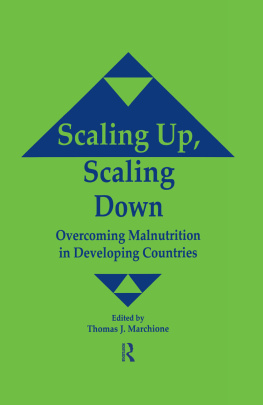First published 1999 by Gordon and Breach Publishers
Published 2013 by Routledge
2 Park Square, Milton Park, Abingdon, Oxon OX14 4RN
711 Third Avenue, New York, NY, 10017, USA
Routledge is an imprint of the Taylor & Francis Group, an informa business
Copyright 1999 OPA (Overseas Publishers Association) N.V. Published by license under the Gordon and Breach Publishers imprint.
All rights reserved.
No part of this book may be reproduced or utilized in any form or by any means, electronic or mechanical, including photocopying and recording, or by any information storage or retrieval system, without permission in writing from the publisher.
British Library Cataloguing in Publication Data
Scaling up, scaling down : overcoming malnutrition in developing countries
1. Malnutrition Developing countries 2. Nutrition Developing countries 3. Malnutrition Government policy Developing countries
I. Marchione, Thomas
616.390091724
ISBN 13: 978-9-057-00547-3 (hbk)
CONTENTS
Peter Uvin
David L. Pelletier
F. James Levinson and Milla McLachlan
Thomas J. Marchione
Peter Uvin
Monique Sternin, Jerry Sternin and David Marsh
Gretchen G. Berggren, Warren L. Berggren, Erve Bottex, Barton R. Burkhalter and Robert S. Northrup
K. A. Pangu, K. Aflagah, M. Kaba, El Hadji Tairou and S. Tchedre
Ted Greiner and M. A. Mannan
Ellen Messer
Timothy R. Frankenberger and M. Katherine McCaston
Milla McLachlan and F. James Levinson
Micheline Beaudry
Thomas J. Marchione
FOREWORD
On the eve of the twenty-first century, new optimism, new commitment and a new sense of challenge have entered into global development. Widespread achievement in improving access to basic health, primary education, clean water, basic sanitation and family planningand in reducing poverty more generally over the last two decadeshas created new hope that further progress is possible and at an accelerated rate. The global conferences of the 1990s, attended by many heads of state, have ensured visibility and new commitments to a series of specific goals for spreading these achievements in all regions of the world.
Nutritional advance has both contributed to and benefited from this record of achievement and growing optimism. Since 1980, the prevalence of stunted and underweight children has been substantially reduced in Asia, Latin America, the Caribbean, the Middle East and North Africaachieving rates of reduction of seven to nine percent per decade in the prevalence of stunting in each region. Only in Sub-Saharan Africa has undernutrition been stagnant: the tragic accompaniment of poor economic and social performance, reinforced by falling export prices, declining international assistance and rising debt.
Stunting and underweight reflect the general inadequacy of protein, energy and micronutrients in the diets of children, along with underlying failures in health and family care. In the early 1990s, this general malnutrition continued to be causally associated with more than half of the 12 million young children who die each year in the developing regions of the world.
In addition to this albeit uneven progress in combating general malnutrition, dramatic advances have been achieved in tackling iodine and vitamin A deficiency. Since 1990, some 60 countries have taken steps to iodinate all salt produced within their borders and require all imported salt to meet international requirements for iodination. The result has been a dramatic decline in iodine deficiency: prevalence has been halved and an estimated 12 million children have been saved from severe mental retardation. Rapid and significant reductions in vitamin A deficiency have also been made by incorporating vitamin capsules into the public health regime for young children, along with other health actions.
The nutrition challenge confronting us in the twenty-first century is to advance these gains. Commitments to accelerate action in tackling nutritional problems are at the heart of this important, positive and energizing volume. deal with the supportive actions that must be taken, analyzed within the important and stimulating framework of scaling up from the grassroots and scaling down from the summit. The summit consists of the governments of developing countries together with the groups that play the critical international role in nutritiondonors, universities, international intergovernmental and nongovernmental organizations.
The approach of the volume is analytical: to encourage a culture of inquiry and analysis, not to present a cookbook of predetermined recipes. Moreover, the inquiry is focused on the practical questions of what to do and how, rather than on the relatively over-addressed questions of why nutrition problems occur. There are case studies covering Vietnam, Haiti, Togo and Bangladesh, as well as numerous references to actual experience in outlining and analyzing approaches that have and have not succeeded.
The concepts of scaling up and scaling down are the hallmarks of the volume. Often, scaling up is used in development speak to mean little more than to ensure that an approach is carried on at a scale sufficient to cover a district or a country, not merely a community. Thomas Marchione and his fellow authors go much further. They make it clear that it is the quality of the relationship between the grassroots and the summit that is important for scaling up to ensure that the summit is listening and learning and is playing its necessary role in supporting and responding. Marchione and colleagues emphasize that the success or failure of most nutritional efforts at grassroots depends on the broader context, including scaling down by the summitthe nature of the responses and support the summit gives to the grassroots. Such support must cover a wide range of formsultimately the creation of an enabling environment that encourages local action; with employment and income opportunities for small and landless farmers: pro-poor growth policies; ready access to cost-effective technologies; and open, fair and dynamic markets, nationally and internationally.
All this underlines the need for effective partnership with the large number of groups involved directly and indirectly in nutrition, and with those engaged in economic and social programming and policy making. The many issues addressed in this book should help provide both the perspective and specifics by which to improve such partnerships.
Reading this book makes clear that the task of reducing and ending malnutrition is a challenging but achievable goal. It is the conviction of Marchione that in the last few years we have entered a new development era, one that provides a new array of opportunities and constraints for addressing the worlds nutrition problems. This new era has been created in part by the end of the Cold War, by ending competition with socialist and non-aligned economic alternatives. Other changes have brought new opportunities and growing emphasis on commitment to human rights, including the right to food and nutrition; the increase in the number of democratic governments; the rising importance of civil society and new knowledge and experience of participatory techniques. Marchione warns about some negative developments: the decline in development assistance, the vicissitudes of market forces, and the reluctance of private investors to offset these trends by increasing support to poorer countries. Most troubling of all are the large number of civil conflicts and complex emergencies, which are so clearly related to the worst of the nutritional situations.










